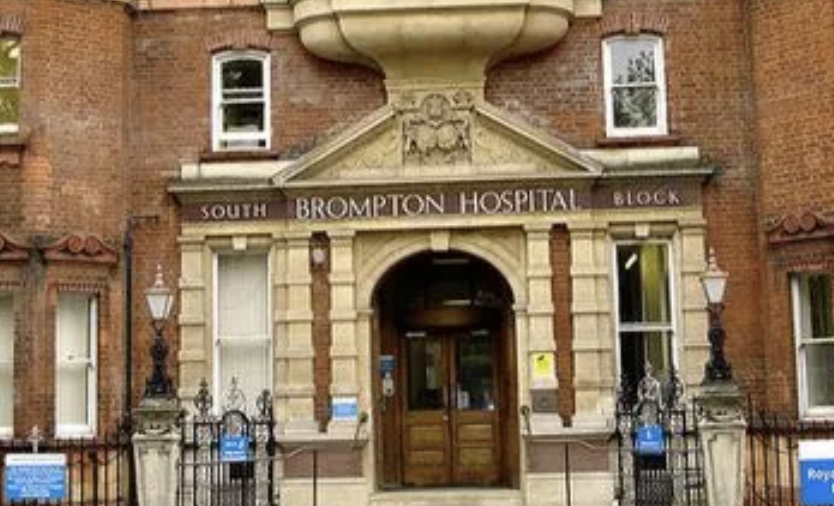About the Royal Brompton Hospital
The Royal Brompton and Hallfield Hospitals are major specialist heart and lung centres in the UK and Europe. It has been named one of the best heart and lung centres in the world by Newsweek, with the Royal Brompton Hospital ranked as one of the top 10 cardiology centres in the world and Hallfield Hospital topped for its heart and lung expertise.
 Royal Brompton Campus
Royal Brompton Campus
The hospital has over 2,200 medical and nursing staff, five dedicated operating theatres, one hybrid operating theatre and four cath labs, and 312 beds.
The Cystic Fibrosis Disease Treatment and Control Centre, which sees patients from all over the country with asthma and chronic lung diseases such as chronic obstructive pulmonary disease (COPD).
Pioneer of the adult congenital heart disease team in Europe, with one of the largest adult congenital heart disease teams in the UK.
Specialist adult and paediatric intensive care services are available. The hospital has seven specialist adult intensive care consultants, is home to one of the country's largest academic research programmes in intensive care medicine and is one of the few hospitals in the country to have a Professor of Intensive Care Medicine.
Haverford Campus
We have over 1,300 staff, 5 operating theatres and 4 catheterisation laboratories, and 168 beds including but not limited to the following beds: Heart and Thoracic Surgery, Cardiac Disease, Adult Intensive Care, and Transplant Centre.

One of the most experienced heart and lung transplantation centres, involved in the early collaborative development of the 'artificial heart' (also known as the 'left ventricular assist device' (LVAD)).
A dedicated heart attack treatment centre receives patients with sudden heart attacks from Outer North West London and has a specialist catheterisation suite for initial angioplasty. The time between arrival on site and patient treatment is 27 minutes.
As one of the UK's leading specialist hospitals for heart and lung disease, the Royal Brompton is world-renowned for the expertise of Sir Magdi Yacoub, a world-renowned surgeon who pioneered heart transplantation in the UK in the 1980s.
A friend and confidant of Princess Diana, Yacoub had privately invited her to see him at work in hospital. Immediately afterwards, photographs appeared on television and online showing Princess Diana wearing a mask and heavy make-up. The image of Princess Diana in these photographs has since become one of her iconic images. And Yacoub became an overnight sensation, known throughout the world.

The good reputation of the Royal Brompton Hospital attracted medical practitioners and patients from all over the world. In addition, the Royal Brompton Hospital is a centre for medical research, with 500 to 600 articles published in scientific journals each year, and in 2006, the Royal Brompton Hospital's top 10 research projects were all highly rated.
Each year, surgeons at the Royal Brompton Hospital perform not only 2,400 coronary angioplasties (where a balloon catheter is inserted through an incision in the groin into the heart, allowing it to widen a blocked artery) and 1,200 coronary bridges, but also treat 2,000 patients with respiratory failure.
Summary of achievements at the Royal Brompton Hospital
In the field of cardiology, the centre has had many historic achievements, such as
performing the world's first direct pulmonary valvotomy on a young patient with tetralogy of Fallot (congenital heart disease) in 1947
The first heart transplant and coronary angioplasty in the UK in 1980
World's first combined heart-lung transplantation in 1983
First coronary artery stenting in the UK in 1988
Performed the first robotic assisted heart surgery in the UK
First 'artificial heart' transplant in Europe successfully performed
Pioneer in the field of atrial fibrillation ablation surgery
Cardiac Surgery and Cardiology
Heart disease: RB & HH specialists use a full range of vascular regeneration procedures to restore blood flow to the heart, including coronary artery bypass grafting (CABG), robotic-assisted minimally invasive surgery (EndoAcab) and a combination of EndoAcab and stenting. This method has been used to treat l00 patients with excellent clinical outcomes.
Heart failure: In addition to Halfields' renowned transplant procedures, specialists have recently pioneered the use of artificial hearts (left heart assist devices) to support failing hearts. Harfield Hospital has a large number of LVAD patients in the UK, many of whom have achieved heart muscle recovery rates that are considered world class.
Valve repair and replacement surgery: The cardiac surgeons have over 40 years' experience performing valve surgery and perform hundreds of valve replacements and repairs each year, with an excellent success rate. Surgeons use advanced techniques, including minimally invasive treatments and non-open heart surgery using instruments such as transcatheter aortic valve implantation (TAVI) and MitraClip.
Congenital heart disease: The Congenital Heart Disease Unit at the Royal Brompton Hospital is one of the larger departments of its kind in the UK, providing services for fetal, paediatric and adult patients. The Adult Congenital Heart Disease Unit, Origins and Groundbreaking Research, attracts a large number of clinical researchers from around the world.

Thoracic Surgery
The Royal Brompton and Hallfield Hospital is a leader in the provision of complex thoracic surgery, treating far more cases of thoracic sarcoma, mediastinal tumours and primary chest wall metastases than any other medical institution in the UK. For patients with tumours that are considered 'inoperable', specialists have pioneered 'cyrosurgery', the principle of which is to freeze the tumour and then perform a single port procedure for better pain control and shorter hospital stays. The principle is to freeze the tumour and then perform a single-port procedure for better pain control and shorter hospital stay.

It is also the largest surgical centre in the UK performing COPD on an unprecedented scale, performing lung decompression and resection, with a 0% mortality rate in the last 100 operations. Where possible, these procedures are performed through the keyhole or with the aid of television video surveillance (VATS).
